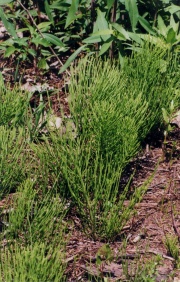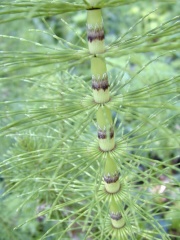Difference between revisions of "Horsetail"
(username removed) |
(username removed) |
||
| Line 9: | Line 9: | ||
== Synonyms and Related Terms == | == Synonyms and Related Terms == | ||
| − | Equisetum hyemale (scouring rush); Dutch rush; rough horsetail; shave grass; scrub grass; gun bright; snake rush; polishing rush; winter rush; evergreen rush; candock; padderok (Dan.; Schachtelhalme (Deut.); | + | Equisetum hyemale (scouring rush); Dutch rush; rough horsetail; shave grass; scrub grass; gun bright; snake rush; polishing rush; winter rush; evergreen rush; candock; padderok (Dan.; Schachtelhalme (Deut.); prêle (Fr.); sphénophyte (Fr.); asprele (Old French); paardenstaart (Ned.); sneller (Nor.); skrzyp (Pol.) |
== Other Properties == | == Other Properties == | ||
| Line 17: | Line 17: | ||
== Additional Information == | == Additional Information == | ||
| − | C.Powell, "The Use of ''Equisetum hyemale'' ( | + | C.Powell, "The Use of ''Equisetum hyemale'' (PrÛle/Horsetail/Dutch rush) as an Abrasive in the Gilding Process on Wood" ''Conservation News'' 66:p.40, 1998. |
[[File:horsetailstrobiluslarge.jpg|thumb|Horsetail]] | [[File:horsetailstrobiluslarge.jpg|thumb|Horsetail]] | ||
| Line 28: | Line 28: | ||
== Authority == | == Authority == | ||
| − | * | + | * Hermann Kuhn, ''Conservation and Restoration of Works of Art and Antiquities'', Butterworths, London, 1986 |
* ''The American Heritage Dictionary'' or ''Encarta'', via Microsoft Bookshelf 98, Microsoft Corp., 1998 | * ''The American Heritage Dictionary'' or ''Encarta'', via Microsoft Bookshelf 98, Microsoft Corp., 1998 | ||
Revision as of 07:30, 24 July 2013
Description
A nonflowering, grass-like plant of the genus Equisetum, such as Equisetum hyemale, found in wet, swampy soil. In medieval times, horsetail was imported from Holland. It was called Dutch rush and used for cleaning pots and burnishing metal. Horsetail stems contain fine-grain silica with small angular fingers. They are used as an abrasive for polishing veneer, burnishing clay, and smoothing gesso grounds.
Synonyms and Related Terms
Equisetum hyemale (scouring rush); Dutch rush; rough horsetail; shave grass; scrub grass; gun bright; snake rush; polishing rush; winter rush; evergreen rush; candock; padderok (Dan.; Schachtelhalme (Deut.); prêle (Fr.); sphénophyte (Fr.); asprele (Old French); paardenstaart (Ned.); sneller (Nor.); skrzyp (Pol.)
Other Properties
Height = 0.2 - 1.5 M Stems=hollow and jointed with vertical ridges Leaves = small and pointed growing in a whorl from each node
Additional Information
C.Powell, "The Use of Equisetum hyemale (PrÛle/Horsetail/Dutch rush) as an Abrasive in the Gilding Process on Wood" Conservation News 66:p.40, 1998.
Comparisons
Properties of Common Abrasives
Authority
- Hermann Kuhn, Conservation and Restoration of Works of Art and Antiquities, Butterworths, London, 1986
- The American Heritage Dictionary or Encarta, via Microsoft Bookshelf 98, Microsoft Corp., 1998
- Wikipedia, the free encyclopedia, at http://www.wikipedia.com Comment: http://en.wikipedia.org/wiki/Horsetail (Accessed Oct. 30, 2004)


